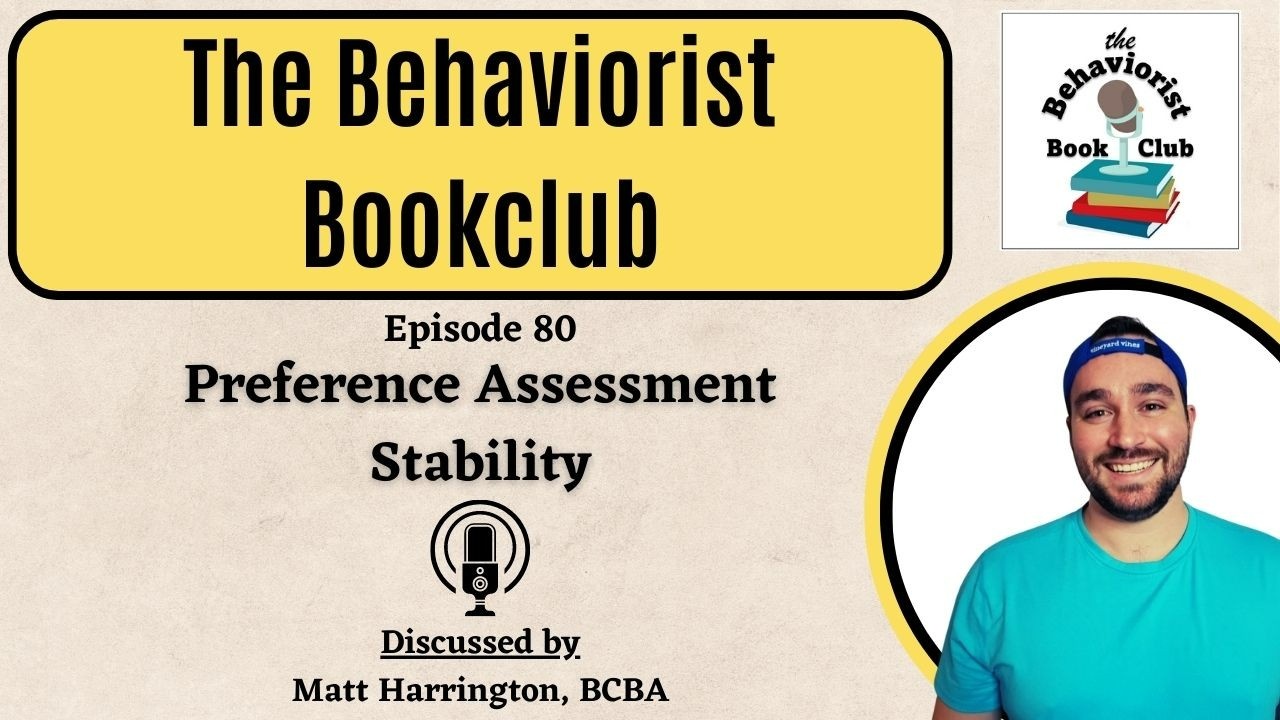Ep. 80- Preference Assessment Stability
Jan 11, 2023
Hey there behaviorists!
In this podcast episode, we talk about the all-important topic, preference assessment stability. Well, to be slightly more specific, we break down an article that talks about the stability of an MSWO preference assessment for sexual partner preference. And while this might not be the most applied population, I would argue that the question is fairly applied!
The question of course is: How long can we trust the preference assessment for?
This is a valuable question when it comes to clinical work because nearly everything we do as clinicians revolves around some form of reinforcement delivery. And what is the job of a preference assessment? To identify high value reinforcers and reinforcement hierarchies! Therefore, if your preference assessment stability is off, then your intervention/assessment will likely crumble.
Take for example a client I had in the hospital setting. This client had a really tight and well-constructed behavior plan. The intervention worked and was able to be applied across multiple settings with the reduction maintaining. Then, one day, it fell apart! The team I was working with and myself were so confused! Here we were, transitioning to discharge and behavior spiked higher than baseline levels! Eventually, my team lead was able to identify the simple little issue that we all missed… We had not done a preference assessment in nearly 3 months! This small mistake led us to a crucial error. Every stimulus that we assumed to function as a reinforcer simply no longer was valuable. After a quick MSWO to correct our error, the reinforcers were swapped out and everything went back to the way it was before! We ended up having to do this a couple more times, and eventually created a weekly routine of resetting the reinforcers and preference assessments.
I hope it is clear from stories like that and from situations you have undoubtedly experienced in your own work that preference stability is crucial to our work as practitioners.
So, what did the researchers find out in this case?
Well, unsurprisingly, there was a clear stability within preference for sexual partners. Not an extremely surprising result given the fact that there were plenty of articles to back up this hypothesis. However, us practitioners can rest a little easier knowing that the assessments that we use regularly can still provide us valuable information.
Personally, while I liked this article, I do not think I am going to change my clinical work/practice much. The reason is simple… I really like to conduct MANY quick and dirty MSWOs throughout the session and teach my technicians to do the same thing. Think about it… The cost of doing a quick MSWO prior to the start of an instructional set is about 30 seconds! Literally, just “Hey, what are a couple things you want to get when we are done?” (Yes, I know this is not a formal MSWO but it is a quick and dirty way to identify potentially reinforcing items). This 30 second task can be repeated regularly to ensure that you are always programming with the most up to date reinforcers you have. It can also provide valuable information about a client’s general interests and how that affects the rest of your session.
For example, if a client usually selects a social activity such as playing a board game but one day only selects independent play, it is likely that they are demonstrating assent withdrawal from participating in social programming, and that withdrawal needs to be noted and respected!
We end the podcast talking about a question related to PFA & SBT methods, but I think I am going to save that for you to listen to! Check out the full episode above and the citation for the article discussed is below!
Citation
Jarmolowicz, D.P., LeComte, R.S. and Lemley, S.M. (2022), A multiple-stimulus-without-replacement assessment for sexual partners: Test–retest stability. Jnl of Applied Behav Analysis, 55: 1059-1067. https://doi.org/10.1002/jaba.936
Solve your clinical challenges with research using this simple, 3 step process that saves you time and gets you clinical answers FAST.
Learn the Key Places Framework, the Research Finding Framework, and how they work together in this free minicourse.
Signing up will also subscribe you to the email list. Unsubscribe at anytime! We will never sell your information, for any reason.

